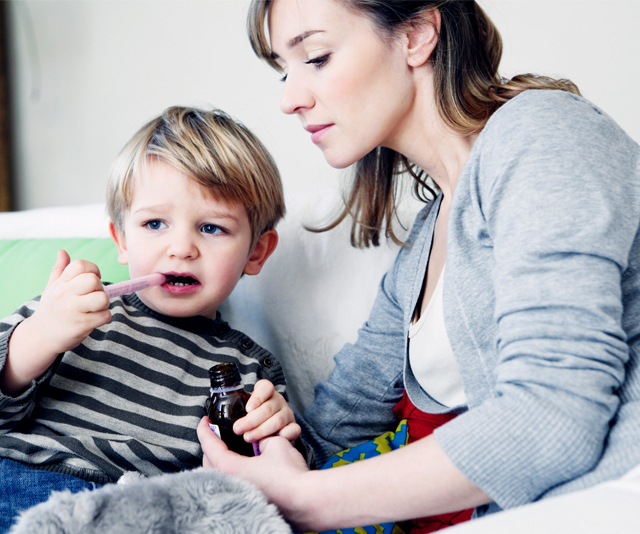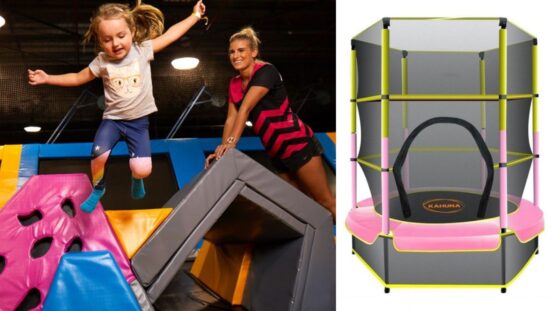MUST READ: The importance of correct medication dosages for kids

Dr. Sarah Gleeson from Family HQ explains everything you need to know about medication use in your home and why you should never EVER use a spoon.
By Dr. Sarah Gleeson, Family HQ
Why are correct medication dosages so important? Because children are vulnerable, and because parents are human beings, and we make mistakes. Especially when we’re tired and are caring for unwell children.
For some reason, there is a tendency for parents to give young children too much medicine. Many parents think that the calculated amounts ‘must not be enough’. Children are much more likely to get too much medicine if it’s in a liquid form, such as pain or fever relief and antibiotics and this can have serious health consequences.
READ NEXT: How does accidental paracetamol overdose occur in small children?

Family HQ was founded by Liz Crowe and Dr. Sarah Gleeson (pictured), two sisters with a shared passion for family health.
In NSW in 2019, the Poisons Information Hotline received more than 1,300 calls in a 10-month period related to accidental paracetamol and ibuprofen overdose in children.
Did you know that in 2016 a study published in the American Journal of Pediatrics showed that when over 2000 parents were tested on their ability to accurately draw up a medicine, a staggering 84 percent of parents made at least 1 error, and that 68 percent of those errors were overdoses.
Things that parents found challenging were different tools to measure the medicine (spoon, syringe or cup), and different ways units of measure were presented (ml, millilitres etc).
Numerous other paediatric studies have shown “that a significant percentage of the parents did not use the correct equipment to administer medications, used non-prescription medicines, did not administer medications at correct intervals and mixed medication into foods”.
Other studies suggest that parents frequently misunderstand instructions regarding how to administer medication to their children correctly, with over 40 percent of caregivers making errors in dosing liquid medications.

The Poisons Information Hotline received more than 1,300 calls in a 10-month period related to accidental paracetamol and ibuprofen overdose in children.
How can you prevent medication errors or accidental overdose when giving medications to children?
For over-the-counter medications:
- Make sure you know your child’s weight: Medication dosages should always be calculated based on your child’s recent weight. The individual pack dosage guides provide a general age and weight dose estimate. However, if your child is significantly overweight, please seek advice from a pharmacist.
- Check the active ingredient: There are many different brands of paracetamol available in Australia (Dymadon, Panadol), and individual pharmacy brands (Amcal, Pharmacy Choice, Chemist’s Own, APO Health), and it is easy to become confused. For safety and simplicity, I strongly suggest sticking with a single brand and a single strength of paracetamol and ibuprofen.
- Read the Instructions: Follow the instructions for weight, rather than age on the packet, ESPECIALLY if they are less than the average weight for their age.
- Check the expiry date: Time passes quickly and it’s very easy for medications to go ‘out of date’. It’s important to check all medications in the house every few months to avoid a situation where you’re stuck with an out-of-date medication in the middle of the night.
- Keep medications out of reach of children: Ideally in a lockable container or cupboard, alternatively, up high in a cabinet out of reach of children.
- Draw up medications in good lighting: This sounds obvious, but parents are often trying to draw up medications in the middle of the night without waking everyone up.
- Use a quality syringe with a 0.1ml increments (10 little lines per ml): Always use the syringe provided in the pack. Generally, they’ll click into the bottle opening for a mess-free and easy draw-up. Once you’ve pulled the syringe back to the desired dose, hold it up to the light and check for any air bubbles, especially the case if the syringe is ‘frosted’ or not completely see-through.
Generally, we don’t think of a millilitre of liquid as being a great deal. But when you’re dealing with doses of 0.6ml (for a small baby for example) adding an extra ml here and there can be a serious issue. - Always keep medicines in their original bottles or packaging: It’s tempting to combine bottles when you have a few that are half-full. Don’t do it, they will likely have different expiry dates, and could be different strengths.
- Always record which medications (including how much and when) have been given to children: It’s incredibly easy to forget exactly which medications you’ve given and when. Especially if you have more than one child who is unwell in your house. This means it’s very easy to accidentally overdose your child. Using a medication tracker app is an easy and safe way to record which medications have been given.
- Communicate clearly with your partner or other carers about which medications have been given.

Always use the syringe provided in the pack. Never EVER use a spoon.
For prescription medications:
- Double-check the instructions on the packet/bottle and make sure that for prescription medications, your child’s name is on the bottle: Doctors and pharmacists are human too and make mistakes, always double-check the package so that you have the right medicine for the right child. Do you understand the instructions? Does four times a day mean around the clock, or during waking hours?
- Double-check that your child is not allergic to the medication that has been prescribed or dispensed: If you’re not sure – ring the pharmacy and double-check.
- Keep prescription medications at the recommended temperature, out of reach of children: This is really important. Many medicines need to be kept in the fridge, or at ‘room temperature’ which can be tricky in the Australian summer.
- Never use a spoon: Use a quality syringe with a 0.1ml increments (10 little lines per ml). NEVER EVER use a spoon, unless you’ve already measured the amount with a syringe first. In the studies mentioned at the start of the article – the vast majority of medication errors were related to using spoons to measure the medicine.
By following all the tips outlined in this post, as well as always following the on-pack guidelines, you’ll be doing everything you can to minimise the risk of accidentally giving your child an incorrect dose.
Worried you’ve given too much? You can call the friendly team at Poisons Info 24hrs a day on 131126 and they will give you calm advice about what to do next.
As a mum to 3 boys under 7, I know how hard it can be to keep track of who gave what medication and when they’re unwell. The Family HQ App is a medication tracker designed to help parents accurately track essential information when their child is sick.




